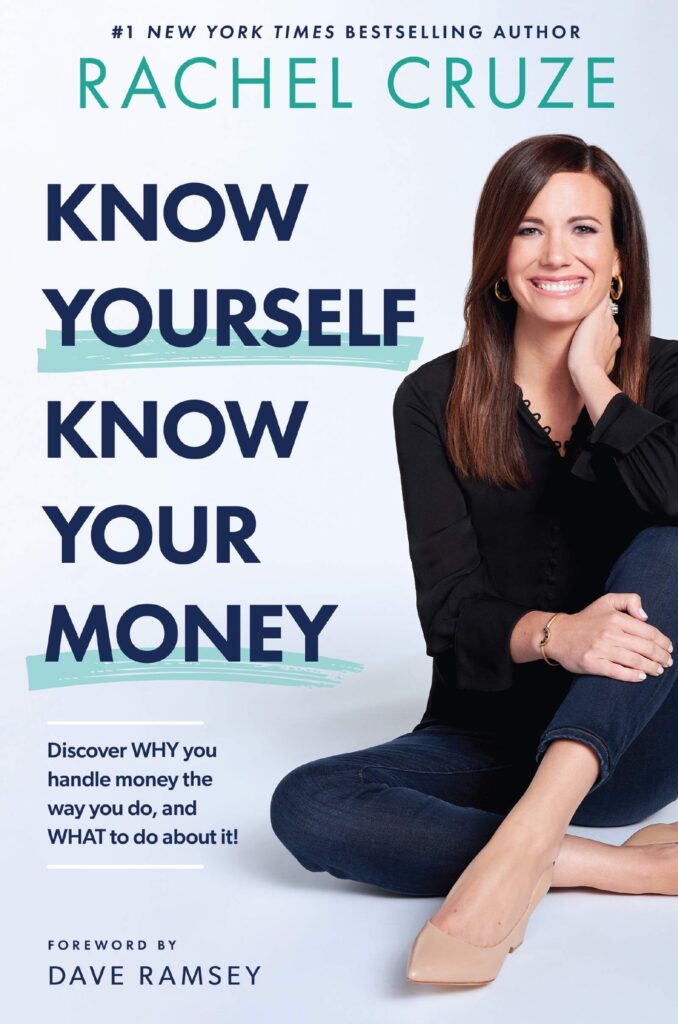Sharing my learnings from the book, Know Yourself, Know Your Money by Rachel Cruze
Know Yourself, Know Your Money by Rachel Cruze
The biggest obstacle from where you are today to becoming wealthy is NOT opportunity or income—it’s you controlling you.
In her brand-new book, Know Yourself, Know Your Money, personal finance expert Rachel Cruze explores how your behavior is the biggest obstacle to making good decisions with your money. When you take a closer look at your behavior and beliefs, money problems are usually just a symptom of a larger problem in your life.

- money might not make you happy, but being broke will definitely make you miserable.
- If you want to make better choices and improve your personal finances, you have to first understand why you handle money the way you do.
- All children learn about money in two different ways. The first is what their parents communicate verbally. The second is what their parents communicate emotionally.
- some don’t talk about money at all. This creates a verbally closed classroom. Others are open – parents bring up issues like bills or investments at the dinner table.
- Emotional communication meanwhile can be positive or negative. In some households, children feel a sense of calm when financial topics come up. In others, money is associated with stress and anxiety.
- Awkwardness and fear are the most common symptoms of the anxious classroom. remember: fear thrives in the darkness. The more you bring it into the light, the less power it’ll have over you.
- The problem with parents openly airing their grievances about the household finances is that kids are both highly receptive to negative emotions and incapable of doing anything to change their situation. The result? A sense of powerlessness in the face of instability and chaos. Call it the unstable classroom. In it, adults never stop talking – or shouting – about money, but they never seem to get a handle on their finances either. While there are plenty of issues, there aren’t a whole lot of solutions. It’s easy to see why graduates of the unstable classroom tend to be apathetic about money. Having been taught that it both causes conflict and comes and goes spontaneously, they often try to avoid the subject altogether.
- growing up with enough money – or at least the idea that there’s enough money – can also be an issue. Which leads us to the unaware classroom. If you grew up in this classroom, there’s a good chance you never worried about money as a kid.
- Some say ignorance is bliss, but that doesn’t apply here. At some point, you need to take control of your own money. If you haven’t been taught how, that’s going to be a tall order.
- Not being taught about money also has practical implications. Kids reach adulthood and suddenly discover that this thing they don’t know anything about is really important.
- Life is unpredictable, but there’s one thing that’s almost guaranteed: there will be times when you need cash to bail yourself out. A good starting point is $1,000, an amount that’s both low enough to be realistic with a bit of hustling, and large enough to cover a lot of unexpected expenditures like car repairs and smaller medical bills.
- The snowball method is the simplest way of getting yourself out of debt.
- take stock of your debts. What do you owe, and to whom?
- you have only one goal: clearing your smallest debt as quickly as possible while continuing to pay the minimum on every other debt.
- Once you’ve cleared your first debt, you can move onto the second-smallest debt. And Once that’s gone, you’ll move on to the next and keep repeating this process.
- Cut expenses and avoid debt by only buying things you need.
- it’s a terrible idea to make financial decisions based on what others have. What you’re essentially doing is comparing yourself to someone who’s broke. Needless to say, aspiring to be like people who are broke is a terrible financial plan!
- The best way out of this trap is reflection. Think carefully about your purchases. To help you do that, ask yourself a couple of questions before you buy.
- would you still want that if no one saw it?
- Will this purchase really make me happy?
- There’s a happy medium between penny-pinching and overspending.
- endless excuses perpetuate a self-destructive cycle. If you’re constantly overspending because you’re “not good at planning” or running up debt because you “deserve” a treat, you’re stopping yourself from building wealth. Keep doing that and you’re going to remain locked into a life that doesn’t make you happy.
- there are penny-pinchers, who are too strict. If you’re also a legalist, you can apply the five-year rule when you next find yourself in a similar situation. Ask yourself, Will this matter in five years? No? Take a deep breath and move on.
- Saving isn’t actually a burden – it’s a source of joy. If it doesn’t feel that way, you might just have forgotten the connection between saving and dreaming.


Leave a Reply